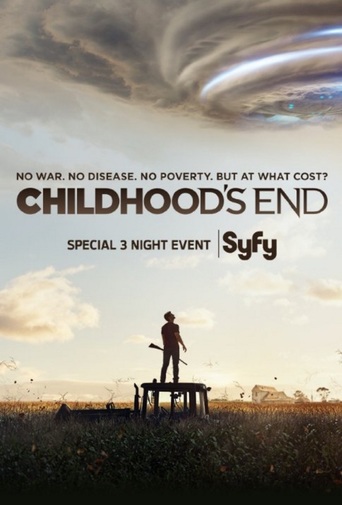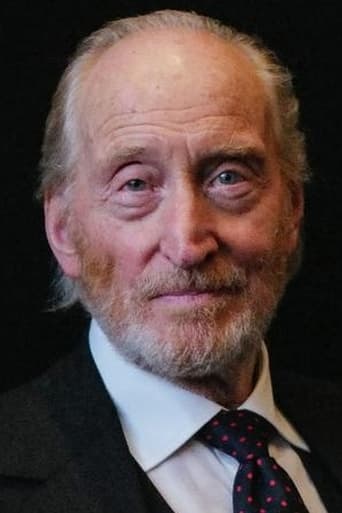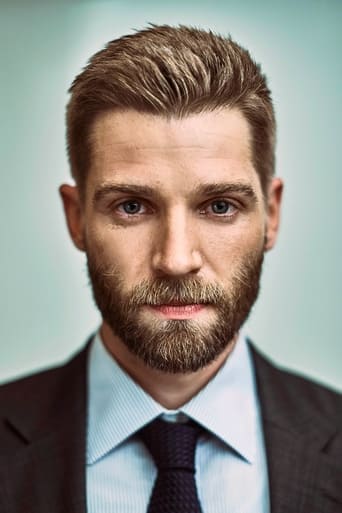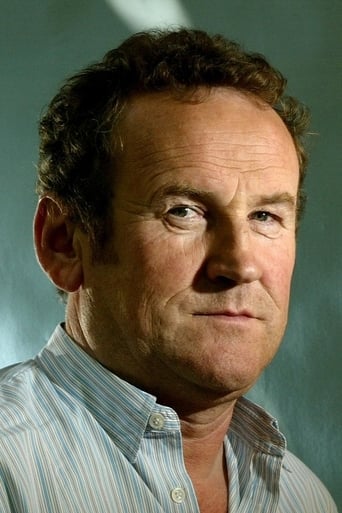

Childhood's End (2015)
After peaceful aliens invade earth, humanity finds itself living in a utopia under the indirect rule of the aliens, but does this utopia come at a price?
Watch Trailer
Cast
Reviews
Please don't spend money on this.
All of these films share one commonality, that being a kind of emotional center that humanizes a cast of monsters.
It is an exhilarating, distressing, funny and profound film, with one of the more memorable film scores in years,
It is a whirlwind of delight --- attractive actors, stunning couture, spectacular sets and outrageous parties. It's a feast for the eyes. But what really makes this dramedy work is the acting.
British author Arthur C. Clarke's sci-fi is especially interested in humans evolving in response to meetings with alien intelligences and this story is no exception. It bears some resemblance to "2001" and those other "Odyssey" stories. I have not read the book (and surprise myself by being unaware of it), but it should be noted that this is another of those Clarke short story then long story issues, which means that the first ideas behind what we see here emerged as long ago as in 1946. That's obviously an interesting date, and one in which the potential of the human species to generate extreme misery was writ large. In this TV version, we move forward to the present day, but the world of 2015 is no picnic either, is it?From what I see of the descriptions of Clarke's novel, this 2015 Syfy offering from Brit Matthew Graham seems reasonably faithful to it, so in some sense we can rest assured that we are looking at high-quality science-fiction ideas actually originating from that genre's golden age. So how then do the makers manage with bringing it to the screen?Those watching the three-part miniseries will first and foremost note how everything keeps changing in it. The timespan covered here is a long one, and the three episodes witness the coming and going of key characters and - in keeping with the "evolutionary" theme - our ideas about what we're witnessing are entirely different by the time the curtain falls - as it were. Wonderfully, by the way, we Brits who love our great national composer Ralph Vaughan Williams to bits get to see just how much store should be set by his wonderful piece "The Lark Ascending" - a genius choice that matches with where the plot has come to in every possible way! Presume this is a directorial touch - and many thanks for it, Matthew!The series also ends where it begins, so in some sense is one giant flashback - though happily we are pretty much unaware of that for the entire time.Definitely, the peak achievement comes with the end of episode 1, when our unending misgivings about how utopian the utopia being shaped on Earth really is, seem to get their full vindication, and give specific corporeal form to what has so far only been the (often witty as well as calm, seductive and wise) voice of Charles Dance's Karellen. This is by far the best-known face here (in a way!), and this was an inspired choice. Other actors are mainly unknowns and their achievements here are more limited than that of Dance, and varied. One of those many aforementioned important-but-in-fact-entirely-expendable characters is that of Hugo Wainwright, as played by Colm Meaney, who narrowly avoids caricature to have his character do the necessary from the point of view of the story ... before being finished off.The lead roles played by Mike Vogel and Osy Ikhile are a bit forgettable, but that is inevitable in a film (and previous book?) whose idea is stronger than any of its characters - except Karellen, of course. This kind of approach gives the series a very specific feel of shifting sands that is entirely personified by our feelings (and those of the Earth) for Overlord (in fact one of many Overlords) Karellen. First we fear him, then welcome him, then are terrified of him, then think he's better than he looks, then fear again, then feel somehow happy when a human being abandons his own life to save the all-too-mortal alien, who later appears less and less all-powerful, and is ultimately seen to be in a less favourable position than members of the human species (or at least the children there of). It's a kind of rollercoaster that has its charms, and most of them I'm not spoiling here at all.In filming, we see homage paid to Close Encounters, Independence Day, Children of Men, The Midwich Cuckoos, Falling Skies and a great many more, and it's quite possible that newish watchers in 2015 will have no awareness of that heritage. For me it was OK, though some might be critical. In story terms, you may well end up thinking - oh no, not that idea again! Indeed, Star Trek for one drew on several of the key concepts here (e.g. about how perfect worlds might be too perfect), but Clarke's 1946 obviously predated that, as it predated a great many now-familiar sci-fi steadfasts. And any threads that we followed with foreboding - that this is not right, that humankind was not supposed to be like this - eventually get written over, as - in true Clarke style - the ending is actually optimistic as much as pessimistic, though it requires the abandonment of all we know and hold dear - except of course "The Lark Ascending", a reminder that our crude, rough-and-ready world of war and greed also creates beautiful things that presumably touch and inspire even the universal consciousness of the cosmos, should this creation of the book and film actually exist out there anywhere. The irony is of course that we would take the beauty we do create and have for granted, were it not so strongly contrasted with humankind's capacity for messing things up. Below us the chimps, above us the angels and - as Star Trek made clear - what we have is something special, however bad it may look. But Arthur C. Clarke got to this idea first, and those who watch this worthwhile version of "Childhood's End" should bear that heritage in mind.
I have read and loved the book long time ago so was excited to see this production. It is uneven and has a bit of missed potential but still worth a viewing.Part 1 - 8/10 Has all the elements of good sci-fi and took a decent take on the marvelous Arthur C Clarke novel. It had philosophical issues, clever dialogue ("you are my world'), situations and good visual effects. It had both emotional resonance and distance Part 2 - 7/10 Starts brilliantly with the boy now being an astrophysicist and the appropriately chosen Imagine song (Eva Cassiy version of John Lennon masterpiece) with the visual montage and narration at the beginning that are as idyllic as the utopia it portrays. It falters with the introduction of a new family and their problem child. It focuses too much on religion and starts to become too much like the Exorcist, Stigmata, Da Vinci Code or any movie too focused on Devil/Evil parables and paranormal. The bond between the astrophysicist and his friend is great and their acting. The setting in he South Africa party is also a good ambiance. The Overlord powers are downplayed here versus part 1 when their power is almost infinite. They line that humans are deceiving themselves (in answer to the part 2 title) is priceless! Some good moments to be had with a few faux pas.Part 3 - 7/10 Has a good relationship angle between the astrophysicist and his girlfriend as well as his/their journey. The love triangle with the main character continues to be well written and acted. The ending is strong in the way that it is daring and unexpected, however the whole children aspect is played out rather poorly in my view. A fitting ending but that could have been done much better with more dramatic tension and better screenplay. The last video-recording of the scientist feels out of place and scope. Pop tarts? Pop art?Almost.
This should have been great, given the source material. But the producers discarded key plot points and crucial dialogue from the novel in order to focus on cookie-cutter emotional shtick that padded this piece out enough to fill a three part mini-series.It wasn't without its moments -some gorgeous cinematography and sound design, but the main weakness was the uneven pacing, and logical inconsistencies within the narrative.**Very mild spoiler** 15 years pass at one story break, but most characters don't age or really change in any way. At one pivotal point an important character is shot and the audience is expected to care, although the show had earlier established that the Overlords can not only stop objects mid-flight (aircraft), and stop time, but also heal bullet wounds and bring recently dead people back to life. **spoiler ends**None of the gun-play appeared in the original novel -it was all added for the TV show (you might ask why? Did the producers feel that Americans wouldn't watch a show with guns? "That's the problem with Hamlet -not enough car chases...")The religious symbolism used throughout the show was also annoyingly overplayed. It made me question whether the writers had either read or understood the original story at all.If you loved Clarke's novel, you will be angry with this clumsy adaptation. If you haven't read it, then this is an okay little series that is not particularly good or bad in any respect. Just okay. The great thing about not being familiar with the source is that you won't know how far short of its potential greatness this mini-series falls
...transformed into a mind numbing series of epic proportions!What a mess, what a train wreck of a TV series!To start with, Clarke's book is one of those overrated books. I never understood why so much fuss about it. The book starts with a bang and then fizzles slowly up to one of the most anti-climatic endings in Scifi history, it is meandering story with some stupid things thrown into the story (e.g. the Ouija board).The series, on the other hand is simply tedious, boring with as little scifi as possible. It is too talky, too focused on interpersonal relationships, on the "human side" of things and all that usual blablabla about uninteresting humans and their uninteresting lives.Watching it is the equivalent of a very very heavy Thanksgiving meal followed by your Uncle Bob and the slide show of his latest vacation in Cleveland, Ohio.One episode of Childhood's End is a perfect cure for insomnia, three of them is a life-threatening central nervous system depressant.


